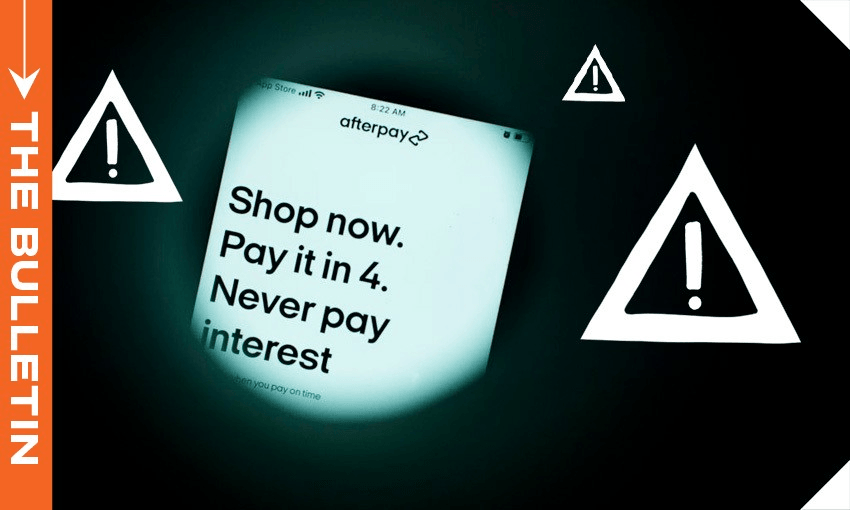Providers like Afterpay don’t have to carry out affordability tests and were recently allowed to set fees at whatever level they like, writes Stewart Sowman-Lund in this extract from The Bulletin.
To receive The Bulletin in your inbox every weekday morning, sign up here.
David Seymour gets his way
I recently bought something on Afterpay for the first time in months. I’d been forced to delete the buy now pay later (BNPL) app when applying for a mortgage, but setting it back up was… almost too easy. The reason I mention this is because BNPL schemes have been back in the news recently. The providers, which offer near instant access to interest free instalment pay plans on almost anything, have recently had some consumer protections removed.
As the Herald’s Jenée Tibshraeny reported (paywalled), cabinet agreed to allow BNPL providers to set late or default fees at whatever levels they wish, exempting them from a requirement under the Credit Contracts and Consumer Finance Act (CCCFA). The decision came after David Seymour, as minister for regulation, overruled his colleague, commerce minister Andrew Bayly, who had wanted to ensure BNPL apps couldn’t charge users extortionate fees. Seymour believed that providers should set their fees at a level customers were prepared to pay. “That’s not something I think a politician can decide,” he said.
Backpedalling on affordability tests
It’s been a two year road to get here. In 2022, the Labour government announced they would bring BNPL providers into the CCCFA in a bid to stop “vulnerable” consumers falling into debt traps. You can find a more detailed explainer of the proposed changes here, but in short, the then-commerce minister, David Clark, wanted loans of $600 or more to come with the same types of protections offered to borrowers that use credit cards and personal loans.
But less than a year later, the government backpedalled on some of these protections. As Claire Dale explained in this piece for Newsroom, while BNPL providers will still now be required to complete credit reporting, they would remain exempt from affordability and suitability assessments. The government believed that was “too onerous for these short term, low value, interest-free loans”.
Why this matters
Critics have argued that as delayed payment schemes inherently involve taking on debt, they should be subject to more of the consumer protections that apply to other loans. Users of Afterpay, for example, are still able to borrow $2,000 – not as much as you might be able to access on a credit card, but still a sizeable amount if you run into financial difficulties. You won’t get loaded with interest, but you will be charged fees for missing payments (Afterpay has promised not to increase its fees despite the government’s latest deregulation). Afterpay, reported RNZ, says 95% of payments were made on time in the first quarter of this year.
In this piece for The Conversation, AUT academics Aaron Gilbert and Ayesha Scott explained that survey data found that delayed payments “appeared to be putting people under increased financial strain and compromised their overall financial wellbeing”. By contrast, the researchers claimed, credit cards and hire purchases didn’t “significantly increase over-indebtedness” due to the protective regulations in place.
There has also been a shift in the types of purchases being made with Afterpay. What was initially a service used primarily for discretionary spending, like clothing, is now being more widely used on everyday items. In 2022, The Spinoff’s Reweti Kohere reported on concerns about Afterpay being a payment option for alcohol, with advocates worried about the ability to use short term loans to pay for non-essential products. While one bottle store U-turned after pressure, others are still accepting Afterpay as payment.
Where to from here
New Zealand is ahead of the curve when it comes to regulating BNPL schemes. That means other countries are currently deciding how far to go with their own crackdowns. Credit checking became mandatory earlier this month, but Dale argued in her piece for Newsroom that it wouldn’t be enough. “Every dollar that is lent to a consumer without an affordability assessment is putting that consumer at risk of unmanageable debt and may cause harm to the financially vulnerable,” wrote Dale. In comments to The Post, Jake Lilley from budgeting company Fincap agreed, and argued that affordability testing should be a requirement. In Australia, parliament is discussing a similar credit reporting requirement, while the UK’s new Labour government wants to see affordability tests as had been proposed here in 2022.
The flipside of this is that there is clearly a market for BNPL schemes, and the market has shrunk in recent years. Afterpay, which claims to have 24 million users worldwide, is now one of just three providers in New Zealand, with Humm and Genoapay closing and Laybuy being bought by Swedish giant Klarna. Making it harder to use these schemes could see the competitive market shrink even further.


